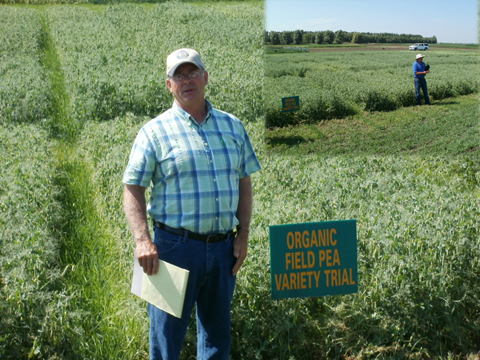A Collaborative Effort to Develop an Organic Field Pea Variety
Organic agriculture poses unique challenges for the organic farmer. Some of the challenges are limited variety selection and availability of certified organic seed. Recent surveys illustrate the use of certified organic seed by certified organic farmers to be low (19-47% depending on crop type). Results also demonstrate that farmers are attempting to source more organic seed, although variety choice and availability of organic seed is a challenge. The USDA’s National Organic Policy (NOP) requires the use of organic seed when commercially available. When the NOP began the organic seed sector rarely existed and is continually growing to meet the demand of organic production. Currently there are few public and private breeding programs focusing on the development of organic seed. A basic principle in plant breeding is that you “breed and select in the environment of intended use”, and for organic agriculture that means selection and development in certified organic fields.
The CREC has a history of variety evaluation, development, and increase. The Center has worked with NDSU along with other University and private plant breeding projects to aid in this mission. The CREC has partnered with industry in a number of ways to assist in variety development. One unique partnership has been in development of a local/regional pea seed industry. We have aided in varietal development from screening experimental cultivars to increasing foundation seed.
During the past two growing seasons a new collaborative effort with field pea was formed. This time the focus was varietal development in certified organic fields. The CREC partnered with industry, Non-Governmental Organizations (NGO’s), and certified seed growers to aid in the development of an organic pea variety.
Pulse USA(PUSA), a farmer/member owned Seed Company that specializes in pulse crops along with Blaine’s Best Seeds(BBS), a double certified (state and organic) seed grower entered 10-12 experimental cultivars from private breeding programs into the CREC organic field pea variety trials (2013 & 2014). This was done to evaluate their performance as a certified organic variety for release to organic farmers. Two NGO’s were also involved in the project, the Northern Plains Sustainable Ag’s Farm Breeding Club (FBC), whose members assist in the development of organic seed through research and education, and the Foundation for Agricultural and Rural Resources Management and Sustainability (FARRMS) a non-profit educational organization that provided the funds for variety testing.
The ultimate goal of the project once the evaluation of experimental cultivars is complete will be to select the best lines adapted to an organic environment then secure seed and rights to grow and sell seed. The seed grower will then grow the varieties in a certified field making organic pea seed available to meet the growing demands of organic agriculture.
Both growing seasons were favorable for the performance and evaluation of the organic field pea variety trials. Click on the links to view the data from each trial year.

Blaine Schmaltz,(BBS) left, and Byron Lannoye, (PUSA) upper right, discuss organic field pea variety
selection at CREC annual field days in 2014 (left) & 2013(right).
A big thank you goes to all groups involved in this project, the combined effort made it possible to address the need, along with FARRMS for providing the funding through the Grants to Grow Seed Initiative program.
To close, a saying used by the early field pea seed growers and distributers as a means of industry promotion is still worth repeating. It simply states “Give peas a chance”.
Happy New Year to all!
Steve Zwinger
Agronomy Research Specialist


